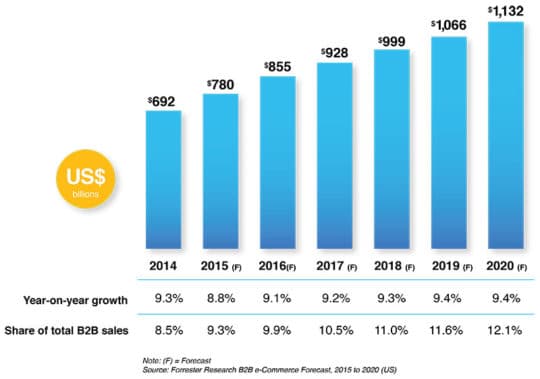Ever since the loudening of the dot-com era, developing the B2B eCommerce stayed on the priority charts of the manufacturers, suppliers, and wholesalers. And frankly, who would like to go to a brick and mortar store, if a tech-gadget connected with the mighty internet can offer an entry to the eCommerce ‘high street’ showcasing the millions of products from thousands of brands, ready for the swift delivery as and when you place the order! However, in view of the research conducted by the industry analyst firm, Forrester that estimates the average revenue generation of 6.7 trillion USD from the B2B eCommerce operations by the end of 2020, the B2B firms have to emphasize further upon eliminating the barriers in eCommerce adoption or else they’ll miss the incredible opportunity of wringing extra gains out of their operations.
Image source: https://www.valtech.com/blog/will-emerging-b2b-growth-eclipse-that-of-b2c/
That said, I’ve listed down the premier strategies used by the top 2 well-heeled eCommerce platforms in the world in order to ease you off the obscurity in finding the right trail for B2B marketing and touch the skies of success:
Alibaba: Seize The Best Market Opportunities As They Do

Alibaba, the largest eCommerce marketplace today, was commenced in 1999 by the poor Chinese fellow, Jack Ma without any fortification of technology, money or background. This B2B juggernaut connected the western businesses and Chinese manufacturers brightened the future of the SMEs and emerged out as the undisputed king of the eCommerce business by rolling the IPO of $25 billion, the best-ever in the planet’s history. Want to know their strategy of success? Have a read:
1. By Harnessing The Power Of Big Data

- Being smart enough to realize the soaring number of netizens in China who turned to the internet for searching, interacting, and learning about the wares and services, Alibaba hauled out the relevant data regarding the consumer spending, business income, sales etc. from their accounts on its Taobao and Alipay programs to create the effective business strategies.
- With its help, it identified the small businesses and extended them the cheaper loans than the banks.
- Also, it backed Mercedes-Benz to launch a targeted online-to-offline promotion for its new compact car brand.
- Moreover, it heavily invested in the cloud computing platforms in order to support its own business as well as of the third parties.
The ‘Big Data Intelligence’ has a long way to go. If utilized judiciously, it can help to toughen up the marketplace design, customer engagement, after-sales service, logistics & location-based services and financial propositions.
2. By Creating The Vernacular Interfaces

- The eCommerce giant, Alibaba is probably the first to understand the value of ‘localization’ and ‘domestic competitiveness’ by grasping the consumption requirements of the remote locals, which are as strong as their English-speaking complements.
- It started off by providing the B2B marketplaces in the 3 vernaculars namely, alibaba.com in English, alibaba.com.cn in Chinese, and alibaba.co.jp in Japanese.
- Other languages like German, French, Spanish, and others are also available now.
- Along with that, it also appointed the language-based backend support, content marketing strategies, and customer engagement teams for rendering the best-in-class experience to ‘lingua franca’ addressees.
The ‘Vernacular Interfaces’ can aid the e-marketers to reach the untapped segments of the economy by deposing the language barriers.
3. By Reaching The Customers Via O2O and Omni-Channels

- Alibaba established a robust ‘Online to Offline’ model for rendering the real-time services to the customers by means of the online social platforms.
- It worked in concert with the traditional offline retailers for integrating the information, analyzing the buying behaviors, stockpiling the inventories, and then endorsing the relevant wares and services on their eCommerce networks.
- Later on, it enabled the customers to browse the e-retail outlets for the choicest products and purchase them at high discounts by using the digital payment mechanisms like Alipay Wallet, etc.
The primary aim of introducing the intuitive ‘O2O and Omni-Channels’ is to deliver the bespoke experiences to the on-the-go audience through the manifold touchpoints- online, on the app, and in-store.
4. By Innovating Secure And Rewarding Payment Options

- Alibaba spared no efforts to bestow the customers with the means of fast cash transaction solutions on their smartphones by launching the QR codes, SMS, mobile apps, NFC, mobile POS, and the latest one, Alipay and WeChat wallet apps.
- These single-touch digital payment solutions are simple, secure, and fast.
- The eCommerce biggie made these payment options, even more, rewarding by combining the Alipay and WeChat wallet with the gamification elements to send a sum of US $642 million to the users in a single day on the occasion of Chinese New Year 2015.
The easier and faster ‘Digital Payment Solutions’ coupled with the lucrative cashback deals, loyalty points, etc. can slash the degree of cart abandonment by a great extent and enrich the overall customer experience.
Amazon: Delight The Customers Like They Do

The legendary Amazon.com was commenced by a North American, Jeff Bezos in 1994 with a primary focus on selling the books alone. Resolute to become the most customer-centric company in the world, the eCommerce juggernaut buried the large number of online retailers with their impressive pricing, delivery, and customer support. Also, a popular study revealed that the 92% of B2B buyers acknowledged Amazon to be their first port of call for carrying out the work-related research and the 82% accomplished their work-related purchases from this platform itself. Wondering a way of creating an Amazon-like effect for your B2B eCommerce platform? Have a look:
1. By Adding Rich And Self-Serving Content

- Every shopper on Amazon appreciated the presence of the accurate product details, pricing, high-resolution images, easy-to-load videos, FAQs, etc.
- Also, the website contains the self-service tools like the customer support forums, automatic tracking data, and others for troubleshooting or researching purposes.
- Moreover, it has faceted search options like that in B2C sites to easy the task of searching a product by applying ‘categories and attributes’ based filters.
The ‘High-Quality Content’ can help to draw in the maximum conversion rate, and compel the customers to come back again and again for more information.
2. By Offering The Real Time Updates

- Amazon humanizes the customer shopping experience by giving them the personalized recommendations based upon their past purchases, browsing behaviors, demographics, or say other shopper’s behavior by saying “Customers who bought this also bought this”, etc.
- Also, it generates intimation updates regarding the limited or out-of-stock inventory to save the customer from the frustration of sparing their precious time and effort on fruitless activity.
The ‘Real-Time Recommendations’ started to expose the customers with the large marketplace are seem to be granting the feel of an in-store experience.
3. By Enabling The Streamlined Checkout And Lightning-Fast Shipping

- Amazon has erected an implausible mechanism with the tools like One-Click Shopping and Amazon Prime that automatically fills up the ‘payment details’ fields by using the backup data, and display a hard-to-believe logistical efficiency.
- Also, the eCommerce giant is testing a Twitter Buy Button that will facilitate the customers to carry out purchases straight through the brands’ tweets.
- Moreover, it has launched an explicit B2B platform called “AmazonSupply” that ensures a free 2-day shipping for orders of 50$ or above along with the special business discounts, tax exemption program, corporate credit scheme, etc.
By offering the ‘Streamlined Checkout And Seamless Logistics Service’, the B2B marketers can bring about a fundamental change in the sales funnel, and free their Reps for handling more generous issues.
Have you heard of the Blooming Names of B2B eCommerce in India?
According to the report of Goldman Sachs, eCommerce sector, a bastion of the Indian economy is poised to grow at a 41% CAGR over the financial years 2015-18. Apart from the ‘IndiaMart’ a leading B2B eCommerce marketplace in India, the reputed names like ‘ExportersIndia’ and ‘Indianyellowpages’, are unswervingly pushing themselves to stay ahead of the curve by aligning their B2B marketing endeavors with the aforementioned approaches like harnessing the true latent of big data intelligence and delivering a 360 degree B2B eCommerce experience to the buyers, suppliers, and exporters.
The 2 eCommerce giants, i.e. ‘Alibaba’ and ‘Amazon’ have laid the roadmap to build an effective digital eCommerce business, let’s hope to see the “brick and mortar retail spaces that are little more than showrooms, by 2022”, as predicted by Eddie Machaalani & Mitchell Harper, Co-CEOs of Bigcommerce.
This article is written by Ankit Gupta. He is counted amongst the promising entrepreneurs of India and owns one of the leading B2B marketplaces of the country ExpotersIndia.com. He is an eminent name in the field of Indian B2B ECommerce, and keeps a keen interest in writing and sharing his thoughts related to B2B ECommerce development. Follow him: Google+ | Twitter | LinkedIn.






